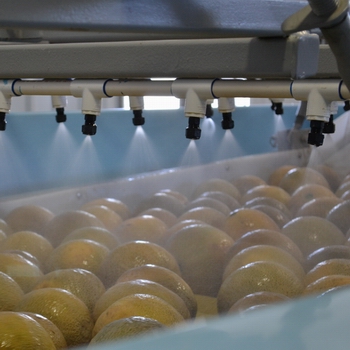The contaminated fruit that killed 33 people and sickened at least 147 others in 2011 came from a farm 90 miles from Rocky Ford, Colo. But the town's many melon farmers took a huge hit nonetheless, and are still trying to convince the public their cantaloupes are safe.
Two years after cantaloupe were linked to one of the worst foodborne outbreaks in U.S. history, lawyers have filed a fresh round of lawsuits. Meanwhile, farmers are trying to win back customers after their signature crop was tarred by a broad brush.
Only one Colorado farm supplied cantaloupes contaminated with the listeria bacteria that killed 33 people and sickened at least 147 more in 28 states in 2011.
Two years after cantaloupe were linked to one of the worst foodborne outbreaks in U.S. history, lawyers have filed a fresh round of lawsuits. Meanwhile, farmers are trying to win back customers after their signature crop was tarred by a broad brush.
Only one Colorado farm supplied cantaloupes contaminated with the listeria bacteria that killed 33 people and sickened at least 147 more in 28 states in 2011.

But that farmer sold his fruit as coming from Rocky Ford, Colo., and the longtime family farmers there, and the whole town, took a huge hit.
"The whole community is very proud of the cantaloupe. The Rocky Ford high school mascot is the 'Meloneer,'" says Mike Hirakata, a fourth generation melon grower here, "very proud to be Meloneers."
The tainted fruit came from a farm 90 miles away, but Rocky Ford farmers had never trademarked their local name and couldn't keep others from using it. That had never been a problem until 2011. The area's farmers have now legally protected their name, and they're taking other measures to convince the public that the cantaloupe they've built a 100-year reputation on are safe.
"If we wanted to keep going, we figured we needed to make changes that were for the better for our industry and for the customers," Hirakata says on a tour of his packing shed, newly refurbished with hundreds of thousands of dollars in new equipment.
He shows off the melon washing station that sprays his cantaloupes with clean water and sanitizer before the fruit are sent to an enormous cooling room. There, the melons are rapidly chilled to further inhibit the growth of any bacteria that might have survived the bath.
Farmers and the state of Colorado also invested in research that found that consumers play an important role in preventing cantaloupe-related outbreaks.
Their survey found that "more than half of consumers weren't washing cantaloupe at all before consuming them," says Marisa Bunning, a food safety researcher at Colorado State University.
"It already looked clean, and they weren't going to be eating the rind. It didn't occur to them to wash it," she says.
But researchers now believe that the deadly bacteria that caused the outbreak didn't penetrate the fruit until consumers cut into it, pushing listeria from the outer rind into the flesh they would eat with each pass of a knife.
"The knife needs to be washed between cuts," Bunning says, "just to be assured you're not causing any cross-contamination from the rind to the flesh."
Rocky Ford cantaloupe growers hired a public relations firm to help get that word out, and to tell people about the new safety measures they're taking to make sure that what happened at the one bad farm in 2011 will never happen at their facilities.
Farmer Hirakata says he never wants to go through something like that again, and not just because of the financial losses his family suffered. For over a week after the outbreak was first identified, he wasn't sure whether melons from his farm were making people sick.
"It was just kind of a sick-to-your-stomach feeling for that whole time, a lot of sleepless nights," he recalls.
Consumers appear to be forgiving, so far. Last year, Rocky Ford growers sold every cantaloupe they harvested, but they only planted 20 percent of a normal crop. This year they're planting more, but still not enough to send any out of state.
At an urban farmers market recently, several native Coloradans echoed shopper Bob Purvine's sentiment about the outbreak.
"It had us all a little paranoid," he said, but "probably wouldn't prevent me from buying the cantaloupe when it comes time again."
Why? Rocky Ford melons, he says, are the "best cantaloupe ever."





